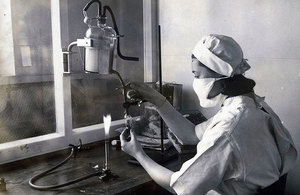Protecting the nation from animal diseases for 150 years
The Animal and Plant Health Agency marks the 150th anniversary of UK state veterinary medicine.

Image of woman in laboratory
From combatting diseases such as foot and mouth disease to helping the UK secure multi-million pound trade deals, 15 October 2015 marks the 150th anniversary of government veterinary services.
The first UK veterinary service was set up on 15 October 1865 when the government established the Veterinary Department of the Privy Council to tackle a devastating outbreak of cattle plague (rinderpest), a highly infectious disease that caused the loss of around 400,000 animals.
In the intervening years, government vets have successfully controlled or eradicated a succession of disease challenges to animal and public health.
Recent examples include BSE in the late 1980s, an unprecedented outbreak of foot and mouth disease in 2001 and three avian influenza cases in England in the last 12 months.
Today, most government veterinary services are delivered through the Animal Health and Plant Health Agency (APHA).
The range of activities delivered by government vets includes:
- disease surveillance – tracking diseases across the world and providing advice to the livestock keepers on disease risk
- providing animal health and welfare advice – working with farmers to improve biosecurity and ensuring that animal welfare is protected on farm and during transport
- eradicating bovine TB - government vets are in the front line of eradicating the disease, providing advice to farmers on reducing their TB risk and managing new cases
- identifying and eradicating exotic diseases – such as the 3 cases of avian flu in the last 12 months, which were all contained quickly to minimise impact on the farming industry and allow trade to resume
- enhancing our reputation of our food and farming industries – our vets play a crucial role in demonstrating our effective disease control measures to other countries, a vital element in securing new trade agreements such as the 2012 agreement with China to export pork products which is now generating £30m each year for the UK economy
Nigel Gibbens, UK Chief Veterinary Officer, said:
The history of state veterinary medicine is founded on protection of animals in agriculture, the food supply and human health, based on a strong foundation of veterinary science. Our work has expanded significantly from these roots, to a modern emphasis on threat identification and mitigation – protection and prevention being better than cure.
The veterinary profession plays a crucial role in protecting the nation from disease threats, and therefore allowing our food and farming industry to thrive.
State veterinary medicine is a profession that is well-equipped to meet modern challenges, supported by the United Kingdom’s world-leading veterinary science. The focus is now on prevention and preparedness, looking to avoid the need to control and eradicate animal disease.
Government vets also protect public health, for example controlling salmonella in poultry, and supporting food security and the competitiveness of the United Kingdom’s livestock and related sectors.
Find out more about key milestones in the history of state veterinary medicine.